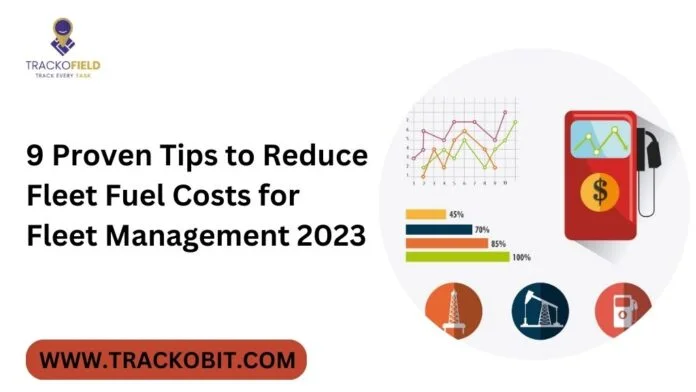Fleet managers cannot deny the fact that fleet fuel costs constitute a major part of the overall operational cost. Fleet fuel management is tough, especially for a full-fledged business operating over 500+ fleets of vehicles on a regular basis.
With that, it becomes a necessity more than a choice for fleet managers to look for strategies & smart practices that can help them reduce fleet fuel costs. Today, fleet managers can optimize fuel consumption and minimize operational costs too without compromising their operational efficiency.
Here are 9 untold but most proven fuel-saving tips for fleets that are always on the road to delivering
Tip 1 – Reduce Fleet Fuel Costs with Telematics
Integrating vehicle telematics systems with fleet management systems can help fleet managers get real-time insights into fuel usage and overall driving pattern. The system can help fleet managers monitor factors such as aggressive acceleration, excessive idling, speeding, and sudden cornering patterns to identify areas for improvement and implement programs that educate on fuel savings.
Tip 2 – Embrace Route Planning Software
Planning and optimizing routes can help avoid long detours, and cover journeys through the shortest routes, thus helping save fuel consumption and expenses. Today’s emerging and advanced route planning software can help reduce the distance travelled, and identify the most fuel-efficient paths and areas with traffic congestion.
The software can help avail real-time data on traffic updates which further helps optimize routes and minimize fuel wastage caused due to the idling of vehicles.
Tip 3 – Schedule Preventive Maintenance
Ensure you plan a preventive vehicle maintenance schedule so that your fleet of vehicles is operating at peak efficiency. Do you know that timely tuning up a vehicle can help increase gas mileage by 4%, on average?
You should schedule routine inspections for checking the vehicle’s performance, change old oil, check tire rotations, replace worn-out parts, etc.
When vehicles are well maintained, they tend to consume less fuel and as well contribute to fewer breakdowns, which leads to fuel efficiency and lots of cost savings.
Tip 4 – Check Tire Pressure
Less pressure in tires can increase their rolling resistance and eventually more fuel consumption. Do you know that under-inflated tires lead to 1% extra fuel consumption for every 10 pounds/square inch (PSI) decline in pressure?
Prioritize a tire maintenance program that involves regular checking of tire pressure and maintaining the pressure according to the recommended levels.
By maintaining tire pressure, you won’t just reduce fleet fuel costs but also enhance the lifespan of the tire and add to safe driving practices.
Tip 5 – Monitor and Train Drivers
Oftentimes it’s the driving pattern that leads to the heavy consumption of fuel. Fleet managers should teach drivers how to maintain smooth acceleration and deceleration, a consistent speed, and avoidance of unnecessary idling to save fuel consumption. Do you know a vehicle can get run out of half a gallon of fuel per hour during idling?
Creating comprehensive training programs about eco-driving techniques can help raise awareness and inculcate fuel-saving habits among drivers.
Other than speed and idling, drivers should get timely coaching on how to avoid:
- Frequent lane changes: Should do it only when required.
- Fast acceleration: Drivers need to avoid rapid acceleration to reduce stress on the engine.
- Fast cornering: Quickly cornering the vehicle reduces the drag and pressure on the engine.
- Hard braking: Before stopping the vehicle, it is a must for drivers to slow up the speed.
Today’s Fleet fuel management software 2023 options are built with advanced algorithms with which it’s very convenient for fleet managers to track driver’s location & performance.
Tip 6 – Consider Carpooling and Route Consolidation
If your business allows, carpooling among employees can be a good option to save fuel. When delivering or cruising on similar routes, you can consolidate no. of vehicles on the road. Fewer vehicles on the road can help you reduce fuel consumption, thus helping you save a big portion of your operational costs.
Tip 7 – Integrate Advanced-Level GPS Tracking
By leveraging next-level GPS tracking systems, fleet managers can get real-time information on vehicle locations and drivers’ activities. By leveraging such technology, they can easily monitor driver behaviour, identify his inefficient practices, and in return can provide feedback and training on how they can improve their driving pattern for better fuel efficiency.
Tip 8 – Evaluate Vehicle Fleet Composition
Evaluate your entire fleet of vehicles to identify which ones are powered by fuel-efficient engines than others. If your fleet consists of old models that are not efficient in fuel savings, replace them with newer models that offer better fuel economy and mileage. When thinking of replacing, you can consider exploring other alternative fuel options such as hybrid or electric vehicles.
Tip 9 – Invest in Electric vehicles (EVs) or alternative fuels
If you feel it’s getting out of hand to reduce fleet fuel costs, you can consider opting for Electric vehicles or biodiesel-run vehicles. Biodiesel is an eco-friendly option that is sourced from animal fats, vegetable oils, and recycled cooking grease to power diesel vehicles.
With biodiesel-run vehicles, businesses will not only cut down on fuel costs but as well comply with state & federal emissions regulations.
Conclusion
Fleet fuel cost is the major expense for logistics and delivery business. And reducing fleet fuel costs has always been a prime concern for logistic businesses. By implementing the above proven 9 tips including the adoption of vehicle telematics, route planning software, promoting driver training, etc., fleet managers can achieve maximum fuel economy without compromising overall efficiency.
It’s high time for fleet managers to adopt advanced route planning, vehicle telematics supporting fleet management software as the challenges of rising fuel prices are cropping up.

